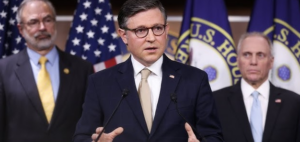House Republicans are advancing a substantial reform initiative for the food stamp program (SNAP) amid President Trump's broader legislative agenda.
House Republicans Propose Major Overhaul of Food Stamp Program

House Republicans Propose Major Overhaul of Food Stamp Program
Reforms aim to realign SNAP with its original intent while significantly reducing federal spending.
The proposal, spearheaded by the House Agriculture Committee, seeks to reform SNAP through measures that include tightening eligibility standards, capping benefits increases, and offloading more financial responsibilities onto the states. This ambitious reform is part of a larger strategy to cut federal expenditures, with anticipated savings exceeding $230 billion aimed at complying with the GOP's budget resolution targets.
The House committee asserts that these changes are crucial in returning SNAP to its core mission: providing temporary assistance while fostering job readiness, rather than promoting prolonged reliance on government aid. A standout feature of the proposed legislation is a provision to prevent the federal government from unilaterally raising monthly benefit amounts in the future, a policy Republicans believe has led to escalating costs. This reform also intends to ensure states take on a more significant share of the financial burden associated with the program, which proponents argue would instill local accountability and minimize federal overspending.
The House Agriculture Committee is set to review the bill this Tuesday afternoon, with GOP leaders eager to expedite its progress through committee. The proposal has garnered enthusiastic support from fiscal conservatives, who view it as a necessary realignment that prioritizes both taxpayers and the agricultural community.
The House committee asserts that these changes are crucial in returning SNAP to its core mission: providing temporary assistance while fostering job readiness, rather than promoting prolonged reliance on government aid. A standout feature of the proposed legislation is a provision to prevent the federal government from unilaterally raising monthly benefit amounts in the future, a policy Republicans believe has led to escalating costs. This reform also intends to ensure states take on a more significant share of the financial burden associated with the program, which proponents argue would instill local accountability and minimize federal overspending.
The House Agriculture Committee is set to review the bill this Tuesday afternoon, with GOP leaders eager to expedite its progress through committee. The proposal has garnered enthusiastic support from fiscal conservatives, who view it as a necessary realignment that prioritizes both taxpayers and the agricultural community.





















